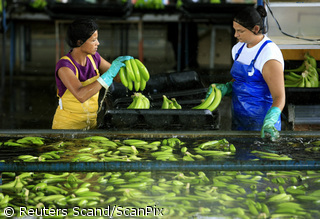Fitch Ratings has revised the Outlook on Estonia's Long-term foreign currency rating to Positive from Stable
Published:
25 October 2003 y., Saturday
Fitch Ratings has revised the Outlook on Estonia's Long-term foreign currency rating to Positive from Stable, the agency said in a press release.
At the same time, Fitch affirmed the Long-term foreign and local currency ratings of Estonia at A- and A+, respectively. The Short-term foreign currency rating was also affirmed at F1. The Outlook on the local currency rating remains Stable.
Estonia's ratings are supported by continuing structural reforms as the country prepares to become a full member of the European Union in May 2004. It is standardizing business practices and legislation at Western European levels, and encouraging foreign investment, the latter of which has contributed to a continuing improvement in the profitability of the corporate and banking sectors. This reform drive has been underpinned by favorable tax rates - particularly on reinvested earnings - and Fitch expects the economy to record strong growth in the region of 5%-7% a year, continuing to raise real per capita incomes, which on a purchasing power basis are already double the level of a decade ago.
Estonia's public finances constitute a considerable support to the ratings. The 2002 budget outcome was much stronger than expected as enhanced tax collection and strong economic activity boosted revenues and the general government sector ran a surplus for the second consecutive year. The country's history of fiscal prudence encourages optimism that the budget will remain broadly in balance, and that the government's tax cutting plans will be countered by strong underlying revenue growth and a cautionary expenditure policy. At 5.3% of GDP, general government debt is already the lowest of any sovereign currently rated in the 'A' range by Fitch and is forecast to fall further. The low borrowing requirement should also continue to support the public sector's strong net external creditor status, which stood at 19% of current external receipts (CXR) by the end of 2002.
Estonia's economic success is reflected by a high level of gross domestic investment, which reached 32% of GDP in 2002. This high investment rate and strong consumer demand have fuelled import growth, causing the current account deficit to more than double last year, while net FDI inflows and reinvested earnings failed to finance the gap for the first time since 1999. Gross external debt increased by nine percentage points of external receipts last year to reach 67% of CXR by end-2002. External bank borrowing undertaken in an effort to compensate for a failure of deposit growth to match that of loans also contributed to an increase in Estonia's net external debt position. Trends over the first half of 2003 indicate that the current account deficit will widen further this year, before starting to narrow from 2004 onwards on the basis of an expected pick-up in external demand. While the government may need to be ready to tighten fiscal policy in the absence of a narrowing of the current account deficit from next year given the limited monetary policy tools at the disposal of the Bank of Estonia, Fitch largely sees recent trends in the current account as a reflection of the present stage of Estonia's successful economic development. External debt ratios remain in line with sovereigns rated in the 'A' range.
Šaltinis:
Interfax
Copying, publishing, announcing any information from the News.lt portal without written permission of News.lt editorial office is prohibited.
The most popular articles
 The EBRD is increasing the availability of financing to the real economy in Hungary, with a €50 million credit line to CIB Bank, including at least €10 million equivalent denominated in Hungarian Forint.
more »
The EBRD is increasing the availability of financing to the real economy in Hungary, with a €50 million credit line to CIB Bank, including at least €10 million equivalent denominated in Hungarian Forint.
more »
 At the end of March 2010, AB Bank SNORAS deposit portfolio exceeded LTL 5 billion, of which over LTL 3 billion are household deposits.
more »
At the end of March 2010, AB Bank SNORAS deposit portfolio exceeded LTL 5 billion, of which over LTL 3 billion are household deposits.
more »
 In affirmation of Vietnam’s remarkable progress towards Middle Income Country status, the World Bank Board of Directors today approved a second loan for Vietnam from the International Bank of Reconstruction and Development (IBRD).
more »
In affirmation of Vietnam’s remarkable progress towards Middle Income Country status, the World Bank Board of Directors today approved a second loan for Vietnam from the International Bank of Reconstruction and Development (IBRD).
more »
 The World Bank today approved a EUR26 million loan to the Republic of Croatia aimed at further improving the efficiency of Croatia’s justice system − a necessary process in Croatia’s path towards successful European Union accession.
more »
The World Bank today approved a EUR26 million loan to the Republic of Croatia aimed at further improving the efficiency of Croatia’s justice system − a necessary process in Croatia’s path towards successful European Union accession.
more »
 The ACP-EU Joint Parliamentary Assembly asked the European Commission to help EU and ACP banana producers adapt to the new EU-Latin America trade agreement, which is expected to put an end to fifteen years of “banana wars” between the two continents, but has raised concerns for the livelihood of some regions' producers.
more »
The ACP-EU Joint Parliamentary Assembly asked the European Commission to help EU and ACP banana producers adapt to the new EU-Latin America trade agreement, which is expected to put an end to fifteen years of “banana wars” between the two continents, but has raised concerns for the livelihood of some regions' producers.
more »
 As seventeen of Africa’s 53 nations celebrate 50 years of independence in 2010, Africa’s “golden moment has come” and investors around the globe must look to the continent often painted only as risk-prone if they are to capitalize on business opportunities.
more »
As seventeen of Africa’s 53 nations celebrate 50 years of independence in 2010, Africa’s “golden moment has come” and investors around the globe must look to the continent often painted only as risk-prone if they are to capitalize on business opportunities.
more »
 During the ordinary general shareholders’ meeting of AB Bank SNORAS, which took place on 31st March 2010, the bank’s profit distribution was approved.
more »
During the ordinary general shareholders’ meeting of AB Bank SNORAS, which took place on 31st March 2010, the bank’s profit distribution was approved.
more »
 The EU is the world's largest economy, with enough international clout to return to "real capitalism" rather than resign itself to an alien "financial capitalism", concluded MEPs and experts at a public hearing held on Thursday by Parliament's special committee on the crisis.
more »
The EU is the world's largest economy, with enough international clout to return to "real capitalism" rather than resign itself to an alien "financial capitalism", concluded MEPs and experts at a public hearing held on Thursday by Parliament's special committee on the crisis.
more »
 Food quality and labelling are likely to be key issues when the Common Agriculture Policy is overhauled in the coming years.
more »
Food quality and labelling are likely to be key issues when the Common Agriculture Policy is overhauled in the coming years.
more »
 The European Investment Bank (EIB) is lending EUR 250 million to Russian company Enel OGK-5 to finance the upgrading of a gas fired power plant located in Nevinnomyssk, South Russia.
more »
The European Investment Bank (EIB) is lending EUR 250 million to Russian company Enel OGK-5 to finance the upgrading of a gas fired power plant located in Nevinnomyssk, South Russia.
more »